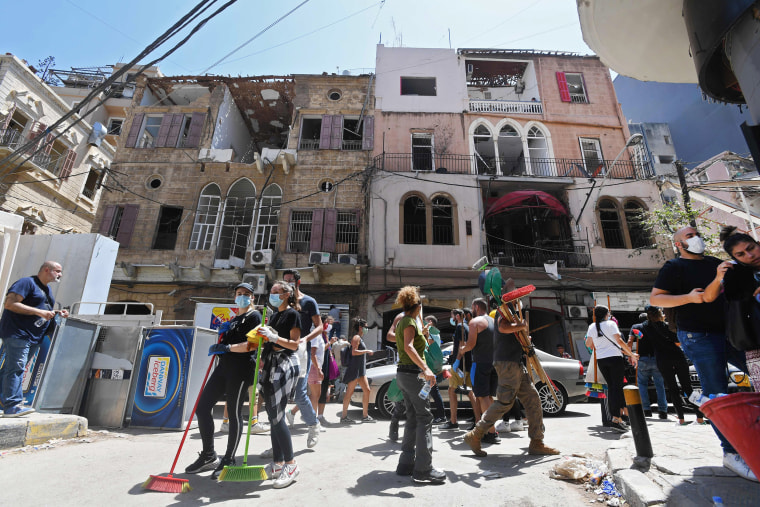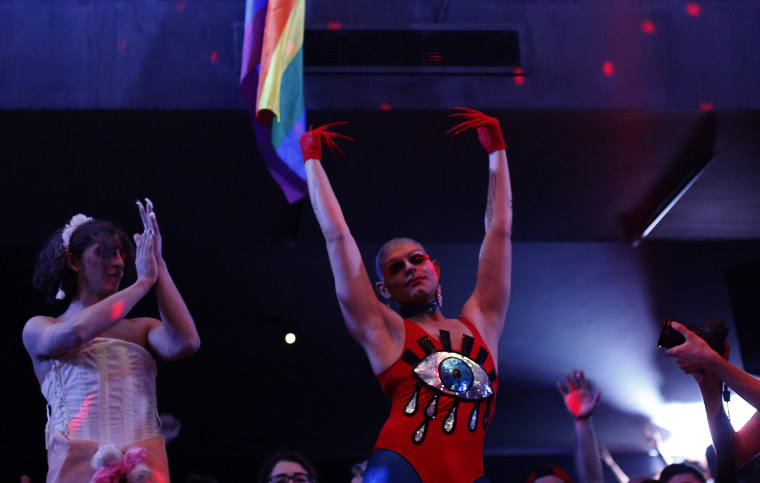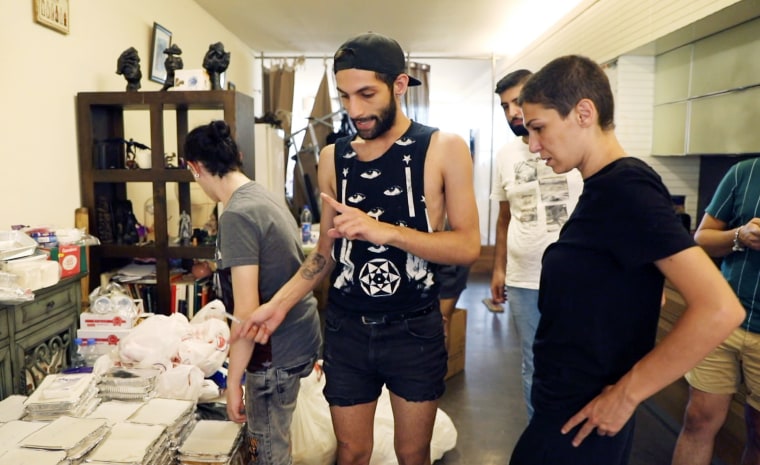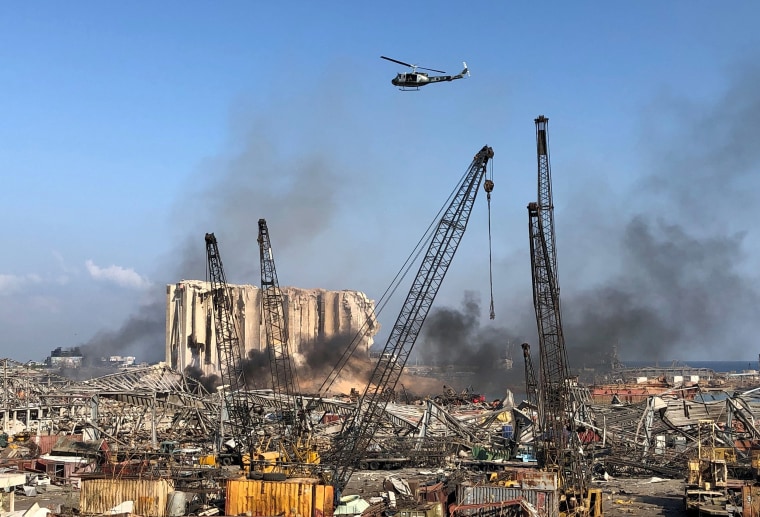In just a matter of seconds, Firas Naboulsi, a 23-year-old drag queen and bartender living in Beirut, lost everything he had worked for.
“We heard the first explosion, then the second one happened,” Naboulsi said of the Aug. 4 blast that tore through the capital city’s port area.
The colossal chemical explosion nearly destroyed his apartment, but Naboulsi and his housemate managed to escape injury and carry a friend with a broken leg to the nearest hospital. The incident, one of the largest non-nuclear explosions in history, killed more than 180 people, injured 6,000 and badly damaged the districts of Mar Mikhael and Gemmayzeh, famous for their centuries-old homes, art galleries, bars, restaurants and clubs.
In those districts, many LGBTQ people, like Naboulsi, also found tolerance and safety in a region not known for queer acceptance.
Naboulsi fled the conservative, Sunni-dominated northern city of Tripoli in 2018 for the relative freedom of Beirut. He said he found what he was looking for: acceptance, friends and a family he chose for himself. But now, following the blast, he said “it was all shattered.”
“Going to this area, it just breaks me,” he said of the torn-apart section of the city he calls home. “We’ve lost most of the venues where we can be ourselves in, and put aside that we’ve lost our jobs, our houses are damaged.”
Following the blast, Naboulsi’s parents, with whom he had not been in contact for two years, came to pick him up and take him back to his hometown. He said relatives had previously threatened him after he had revealed that he worked as a drag performer on social media, but he went anyway. The reunion, however, was short-lived.
“My parents are super religious, so my mom had this conversation with me where she was like, ‘Ah, you can’t stay here because my religion wouldn’t allow me to keep you here, because you’re gay, because you do a lot of things that we can’t accept,’” he said.

Just three days after the blast, Naboulsi was back in Beirut. He said the feeling of rejection was more devastating this time than when he first left home.
“It hurt way more knowing with everything that happened in Beirut, you still … have to leave home because you’re gay,” he said. “I was so close to los[ing] my life, and the only thing you had to say was, ‘I can’t accept you, because my religion doesn’t allow me to.’”
The Arab world’s progressive enclave
Lebanon is considered relatively liberal in the Arab world, even though it remains one of the approximately 70 countries around the globe that still criminalizes homosexuality. Vocal advocates in the tiny Mediterranean country defend LGBTQ rights, and gay bars and clubs are allowed to operate. And while cases involving homosexuality still go to trial from time to time in the country, an 80-year old article in the penal code prosecuting homosexual relations has been undermined in recent years by a successful campaign waged by activist lawyers to obtain liberal judicial rulings, which have made it increasingly difficult to criminalize same-sex relationships.
In 2017, a judge in Lebanon ruled for the first time that homosexuality is not a crime, so long as it is not in public, with a minor or under coercion. However, some police officers still use the law as a basis to arrest and harass LGBTQ people, especially transgender people, according to Karim Nammour, an activist and lawyer for Lebanon-based nongovernmental organization Legal Agenda.

And while Lebanon is progressive when compared to its neighbors, Beirut is progressive when compared to the rest of Lebanon.
“When you want to look at Lebanon as a whole, at least from a personal queer perspective, you have to separate Beirut from the rest of it at least in terms of tolerance,” Sandra Melhem, an LGBTQ activist and owner of Beirut gay club Ego, said.
Melhem called the neighborhoods of Mar Mikhael and Gemmayzeh hubs for the city’s queer community and slammed government officials for storing nearly 3,000 tons of highly explosive ammonium nitrate in the heart of the densely populated capital city for years.
“They kind of took away our hope,” she said. “These are the streets we all live in — not all of us, but a lot of people that are young, that are artists, that are invested in changing the country.”
‘A sense of unity’
Melhem is among those who have turned their anger into action. When she saw that her LGBTQ neighbors had lost homes and didn’t have money to eat, she launched a fundraising campaign. She called out on social media to people who needed help and others who could provide it and was surprised by the response. She said the desire to help overcame a former lack of cohesion among different groups within the lesbian, gay, bisexual, transgender and queer community.
“We got a lot of people who were keen on supporting this and started sending food provisions, hot meal donations, detergents, clothes [and] medications,” she said. “We got three registered nurses on board volunteering, two paramedics … we were actually able to go on ground and start working.”
More than 50 volunteers showed up, including some from Beirut’s LGBTQ community whom she had never met.
“For the first time in years, we are all working for one purpose: to get each other out of this mess. Honestly, the past two weeks have shown a sense of unity I have not seen in a very long time,” Melhem said.

She turned her spacious two-room apartment into a storage space for neatly stacked food trays, cases of bottled water and piles of care packages tailored to specific needs.
Omran Gharib, 26, a registered nurse, was among those who answered Melhem’s appeal on Instagram. He paid home visits to the injured to change dressings and listen to their concerns.
“The most common thing was they were scared of what happened, and they cannot handle the fact that they lost it all,” Gharib said. “They lost the places where they had so much memories, and now there is no place to be like themselves.”
Andrea Nagerian, a 23-year-old drag queen and makeup artist, lost his home in the blast and had to run to a hospital after suffering multiple cuts and internal bleeding. He stayed at Melhem’s home during his recovery and then joined the aid effort.
“The only way we can really use our anger to our benefit is by helping people or helping ourselves to get through the trauma,” Nagerian said. “Right now, we are really focusing on helping … marginalized groups as much as possible … people who are in the depths of poverty.”
Naboulsi has also found solace in helping. After repairing his ruined apartment enough to make it habitable, he spends most of his day at Melhem’s house.
“I’m around my friends and at the same time helping people, so I don’t have this free time to keep thinking about what happened, to keep thinking about what’s going to happen,” he said.
The aid and outreach from the city’s LGBTQ community to other communities following the explosion also helped to change some hearts and minds, according to Melhem.
“We’re entering areas I would never have sent the boys to if they looked very flamboyantly gay. You know, they would be harassed,” she said. “Now when they’re going and they’re lending a helping hand to marginalized communities, people in need … you see that there’s acceptance from the people who previously we would not ever have gone to. So I think it is also lifting the threshold of tolerance.”
While many in Beirut’s queer community are still mourning the loss of homes and popular venues in their neighborhood, Melhem said she’s hopeful that this once-vibrant hub that provided freedom and acceptance can be revived. Her next step is to set up a committee tasked with disbursing donated funds to help people rebuild, and there is also a grassroots movement composed of activists urging desperate residents not to sell to developers seeking damaged but valuable property.
Nagerian said he believes the community can come back even stronger than before.
“I’m someone who lost their home, got severely injured, and I experienced first-hand the explosion, and I’m saying there’s a glimpse of hope — even if it’s bare, and you have to believe in it and push forward and try to use this experience to your advantage and build a new version of what you want to see in the world.”

